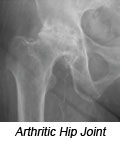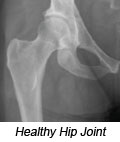Arthritis care at the Center for Orthopedic Surgery
At The Center for Orthopedic Surgery Dr. Kevin Hanlon and Dr. James Kehoe provide care for all types of arthritic conditions. There is no need to suffer through pain and disfunction of arthritis.
When a joint becomes arthritic, degeneration and inflammation of the cartilage, bone and surrounding tissues occurs. Arthritis generally presents later in life and is characterized by the gradual onset of pain, disability, and deformity. However, this process can occur more rapidly in younger individuals, particularly if the joint is deformed or has been injured. The most common form of arthritis is osteoarthritis (degenerative arthritis). Arthritis may also be caused by inflammation (rheumatoid arthritis) or be a result of trauma. Rarely, osteonecrosis (death of the bone) may occur and lead to arthritis. Regardless of the initial type of arthritis, the result is permanent with progressive damage to the cartilage and bone.
The Arthritic Hip Joint

 As the hip becomes arthritic, the protective cartilage covering that shields
the bone from impact begins to deteriorate. Under stress from activity,
the bones begin to grind together resulting in bone loss, cyst formation,
spurring, and deformity. The person with severe arthritis of the hip may
notice pain and stiffness with activities like standing, walking, stair climbing,
getting in and out of a car or putting on socks and shoes. One leg may feel
shorter than the other and the ability to perform daily activities may be very
limited. As the arthritis worsens, an individual may experience pain at rest
or at night during sleep.
As the hip becomes arthritic, the protective cartilage covering that shields
the bone from impact begins to deteriorate. Under stress from activity,
the bones begin to grind together resulting in bone loss, cyst formation,
spurring, and deformity. The person with severe arthritis of the hip may
notice pain and stiffness with activities like standing, walking, stair climbing,
getting in and out of a car or putting on socks and shoes. One leg may feel
shorter than the other and the ability to perform daily activities may be very
limited. As the arthritis worsens, an individual may experience pain at rest
or at night during sleep.
The Arthritic Knee Joint
Your knee is one of the largest, most important joints in your body. Its strength and complexity enable you to perform many movements everyday. When a person experiences problems with their knee such as pain or stiffness, it becomes difficult to complete everyday activities.
Problems with the knee may resolve over time, but sometimes pain or stiffness of the knee joint becomes progressively worse. This is often the case when a person is suffering from arthritis of the knee joint. When a knee has been arthritic for a long time, treatments that have been successful in the past, such as medications, injections, bracing, or physical therapy, may no longer help. Based on your age, your level of knee pain, and the amount of damage to your knee, total knee replacement surgery may be the best option for you.
As the knee becomes arthritic the soft cartilage cushions between the bones begin to wear away. Without this protective padding the ends of the bones rub together. Under stress from activity, the bones begin to grind together resulting in bone loss, cyst formation, spurring, and deformity. The person with severe arthritis of the knee may notice pain with standing, walking, and kneeling. The knee may feel unstable and motion may become limited.

